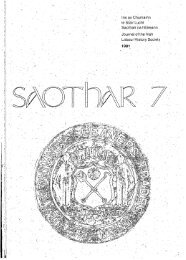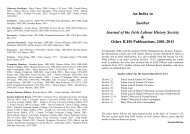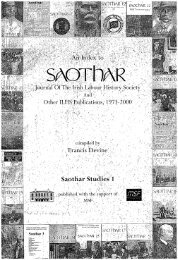38 SAOTHAR13class power. 57 Indeed, her commitment to pacifism extended from the international into the industrialarena. Fox's account of Bennett' s style of negotiation illustrates the point. .·'Tempennentally no one had a greater dislike of class conflict then Louie Bennett. She always looked forpossible points of agreement and common action in industry. She sought for a community standpointratherthan a class standpoint. '58Bennett's own description of her style was 'nagging' .59 She often knew the employers on a personalbasis, and attempted to cajole or embarrass them into agreement with threats to expose how much theirwives or daughters paid for clothing. Her letter to PJ. Besson, Managing Director of the RoyalHibernian'Hotel, and at the centre of the laundry dispute of 1945, illustrates her approach:'In regard to payment for Easter Monday I must add that if your laundresses worked on Easter Monday,we hope that you will give them a double day's pay (in addition to the substitute day in summer) as hasbeen done in another Hotel with which we are in contact. We know you are not legally bound to do this,but it is some compensation to workers for having to be at work on a day when all their friends are onholiday, and we hope you will see it in that light. '60She disliked strikes, and endeavoured to solve industrial conflicts without them. When, as in thecase of the laundry workers in 1945, she endorsed strike action, she did so with determination andconviction, but also in desperation. A woman of strong moral principles, what appalled her most wasthe employers' contempt and indifference to 'human needs and rights' .61 The absence of a classperspective in negotiations was not in itself unique to Bennett although it was undoubtedly informed,in her case, by lack of actual work experience; unlike her trade union contemporaries, Bennett had risento prominence in a movement in which she had neither family nor personal history, and representedwomen whose circumstances she had never directly encountered.Her alternative to industrial struggle was lucidly expressed in a paper on producer-con'sumer cooperativesand vocational organisation. She had developed these views during the 1930s, and enlargedupon them·in the minority report thatSenator Scan Campbell and herself submitted to accompany the1943 Repor.t 6fthe Commission on Vocational Organisation, 62 to which both were ITUC delegates.'We agree.to the principle of vocational organisation, because the general trend of economic andsocial development impels us inevitably towards a system based upon it ... We endorse the mainRecommendations of the Report before us because we perceive in them an effort to evolve a schemefor the Irish people which will co-ordinate and direct their various free associations for the purpose ofderiving the optimum benefits for the community whilst preserving the freedom and rights of theindi vidual. '63Despite similar origins and enemies, Bennett's vocational organisation was not directly comparable tofascism; the above statement continued: .'This care for individual freedom is the crucial point of difference between Fascism and vocatiorialorganisation. Under Fascism the individual becomes acog in the machines. Under vocational organisationas envisaged in this Report, he is endowed with the responsibility of service to a vocation and of sharingin the control of its administration.'While Bennett was one of fascism's sharpest critics,64 her distinction between fascism, corporatismand vocational orgaiJisation was often tenuous. For many, including Bennett, a more sympatheticmodel was Salazaf, whose particular form of Christian authoritarianism met with considerable,although not entirely uncritical, approval in post-Euc:haristic Congress Ireland. 65 Her acclaimedreading of her friend G.D.H. Cole's guild socialism was overshadowed by the influence of Pope Pius
LOUIE ~ENNEIT 39Xl's encyclical Quadragessimo Anno, in 1931.66 Also, her submission to the Commission's reportpraised the efforts of Muintir na Tire, an early form of the irish Catholic social movement. 67 Jn doingso, she found no contradiction between her own Protestant beliefs and her support for Catholic socialteaching; indeed, Bennett shared the latter's revulsion of increasing conflict in capitalistsociety,especially conflict between classes, and the over-powering role of the state.'The problem for nations with democratic aspirations is to find a via media between this [fascism's] deadlyculmination and the anarchic position ofan unco-ordinated mass of associations and organisations;.often·in disastrous conflict with one another and without any clear plan for the common good. '68The profit-motive, she argued, encouraged ~ast inequalities of Zvealth, resulting in increasing socialtension; the state thus felt obliged to intervene in order to eliminate the worst excesses of capitalism,but by doing so it over-stepped the boundaries and endangered the rights of individuals. Poverty andinjustice incensed her because workers, and especially women workers, bore the brunt of the existingsocial system, she had found a home within the trade unions. It was a form of missionary service. 69In its place, Bennett advocated a total reorganisation of society based upon producer-consumer cooperatives,which would unite both worker and employer in a bond of co-operation. Modem societycreated a'tendency for men and women to form themselves into associations of various types for the variouspurposes of life, with the result that we tend more and more to think in terms of groups rather thanindividuals ... This attitude of mind lends strength to the theory that the welfare of the community as a wholemust take precedence over individual interests. '70Vocational organisation could build this natural development by forcing the rearrangement 'andredistribution of the responsibility of services to vocational groupings. Ultimate power would-remainin the control of a democratically elected, vocationally based Parliament. It was Bennett's concentrationon democratic structures that distinguished her proposals from fascism. .Yet, her vocational organisation - alternatively termed co-operativism or collectivism -did not seekto eradicate the profit-motive but only to control it. Nor did it intend to abolish trade unions, albeit theywould eventually be re-organised. It did not advocate any form of anarchism; the state would retaina necessary role, although in a much more limited way. Its goal was simply the elimination of conflict,individualism, unfettered competition and unrestrained pursuit of profit, and their replacement by asociety that insisted upon the 'natural rights of individual and family' .71'I certainly want to see our society system built up on Christian principles in our country ... '72'Our history, our traditions and our religious faith should make us competent as a nation to evolve asocialand economic programme which would 'enable us 'to break through to higher levels of experience' .'73'Life is a mystery: we do not understand whence it comes or whither it goes. We know nothing of itspurposes orultimategoal. But wehave no riihi,to'lay rude hands upon mysteries, above all upon mysteriesround which hang our deepest and holiest inspirations, our hope, or faith, our only intimation of thingsnot seen.'74Bennett's desire to create a better world was influenced strongly by these spiritual values. Againand again she stressed the impact that Ireland as a country with a 'powerful spiritual strain' could haveupon world peace and social progress. Her moral crusade against injustice enlisted the support of 'allunselfish and great-hearted men' including periodic appeals to de Valera and the Pope. In June 1952,the IWWU published the Pope's 'Discourse to the Congress of the World Union of Organisations ofCatholic Women' as a pamphlet entitled Peace and Fraternity (A Call/or Action Addressed to EveryWoman 0/ Every Nation). 75Bennett's support for trade uhionism, and membership of the executive of both the ITUC and the
- Page 1 and 2: JOURNAL OF THE IRISH LABOUR HISTORY
- Page 3 and 4: ContentsPageEditorial: Labour Histo
- Page 5 and 6: EDITORIAL 3freedom to participate i
- Page 7 and 8: CorrespondenceThe Irish Labour Part
- Page 9 and 10: ; ~ ; ,The Decline and Fall of Donn
- Page 11 and 12: THE DECLINE AND FALL OF DONNYBROOK
- Page 13 and 14: THE DECLINE AND FALL OF DONNYBROOK
- Page 15 and 16: ·' THE DECLINE AND FALL OF DONNYBR
- Page 17 and 18: THE DECLINE AND FALL OF DONNYBROOK
- Page 19 and 20: THE DECLINE AND FALL OF DONNYBROOK
- Page 21 and 22: THE DECLINE AND FALL OF DONNYBROOK
- Page 23 and 24: THE DECLINE AND FALL OF DONNYBROOK
- Page 25 and 26: ,'-,;-''''.A PASSAGE TO BRITAIN 23C
- Page 27 and 28: A PASSAGE TO BRITAIN 25only in the
- Page 29 and 30: A PASSAGE TO BRITAIN 27clothing._De
- Page 31 and 32: A PASSAGE TO BRITAIN 29established
- Page 33 and 34: ;:-.",.- .. .", ...... '.:. '
- Page 35 and 36: LOUIE BENNETI 33feminist movement w
- Page 37 and 38: :... ~: ."
- Page 39: -.- '.LOUlE BENNETT 37While there i
- Page 43 and 44: LOUIE BENNEIT 41Bennett's own relat
- Page 45 and 46: LODIE BENNETT 43109; IWWU resolutio
- Page 47 and 48: Essays in ReviewCosherers, Wanderer
- Page 49 and 50: ••• .".'. >. '~"ESSA YS IN RE
- Page 51 and 52: ESSAYS IN REVIEW 49ConnolIy:Myth an
- Page 53 and 54: ESSAYS IN ~EVIEW 51tion' in the Int
- Page 55 and 56: ESSAYS IN REVIEW53International:'I
- Page 57 and 58: REVIEWScontroversy is real history.
- Page 59 and 60: REVIEWSJoe Monks was among the earl
- Page 61 and 62: REVIEWSnolly-Column Song','Proudly
- Page 63 and 64: REVIEWSresulting from the arrival o
- Page 65 and 66: REVIEWS,63the book by means of an a
- Page 67 and 68: REVIEWSlogue, it is hardly surprisi
- Page 69 and 70: The Team For All Workers ...CULIAIB
- Page 71 and 72: ESSAYS 69mission and moral refonn.l
- Page 73 and 74: .. ...... ~.~ -~ .'- '.ESSAYS. 71fr
- Page 75 and 76: ESSAYS 73claimed authority but whic
- Page 77 and 78: ESSAYS 75provided the basis for soc
- Page 79 and 80: ESSAYS 779. For comparisons see E.T
- Page 81 and 82: ESSAYS 7952. Annals of Christ Churc
- Page 83 and 84: ESSAYS' 81Fianna Fail and the Worki
- Page 85 and 86: ESSAYS 83Eireann in 1925 visibly di
- Page 87 and 88: ESSAYS 85recognition of the impract
- Page 89 and 90: ESSAYS 871970, it created the condi
- Page 91 and 92:
ESSAYS89The Irish Immigrants' Contr
- Page 93 and 94:
ESSAYS" 91Although anti -Catholic p
- Page 95 and 96:
ESSAYS 93McCowie played a key role
- Page 97 and 98:
:. -,,'.' ',. .~.,:.ESSAYS 95Althou
- Page 99 and 100:
ESSAYS 97young girl of their own ba
- Page 101 and 102:
SourcesIrish Labour History Society
- Page 103 and 104:
SOURCES 101INovember, 1971 to no. 1
- Page 105 and 106:
SOURCES 103would claim credit for t
- Page 107 and 108:
SOURCES105Sources for Irish Labour
- Page 109 and 110:
SOURCES 107NorthWest Archives and L
- Page 111 and 112:
SOURCES 109In 1966 the Finnish gove
- Page 113 and 114:
TURNINGANEWLEAFThe CPSSUis the larg
- Page 115 and 116:
REMINISCENCE 113us due to my politi
- Page 117 and 118:
REMINISCENCE 115when Jim was presen
- Page 119 and 120:
REMINISCENCE 117of Dail Eireann. 17
- Page 121 and 122:
REMINISCENCE 119NotesThe above arti
- Page 123 and 124:
DOCUMENT STUDY 121James Connolly in
- Page 125 and 126:
DOCUMENT STUDY123SOCIAL DEMOCRATIC
- Page 127 and 128:
DOCUMENT STUDY 125proletariat of th
- Page 129 and 130:
DOCUMENT STUDY 127the support of Je
- Page 131 and 132:
DOCUMENT STUDY 12926. The Workers'
- Page 133 and 134:
131BibliographyA Bibliography of Ir
- Page 135 and 136:
BIBLIOGRAPHY 133Compton, P.A. Demog
- Page 137 and 138:
BIBLIOGRAPHY 135Levine, I. and Madd
- Page 139 and 140:
BIBLIOGRAPHY 137Turner, M. 'Towards
- Page 141 and 142:
BIBLIOGRAPHY 1394. Land and Agricul
- Page 143 and 144:
BIBLIOGRAPHY 141Clogher Record12 (2
- Page 145 and 146:
BIBLIOGRAPHY 143Political Research
- Page 147 and 148:
BIBLIOGRAPHY 145Pres, 1987.O'Brien,
- Page 149 and 150:
147Notes on Contributorsf onathanBe
- Page 151 and 152:
1901: Ireland's first general union
- Page 153 and 154:
ELECTRICAL TRADES UNION .Establishe





